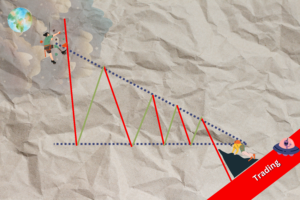The second triangle: the Descending Triangle
Read MoreTrading and the Inner Game: Lessons from Sports Psychology
How trading and sports are similar — even when they are very different.

Trading and sports might seem like entirely different domains, but beneath the surface, they share striking similarities. Both require discipline, mental resilience, and the ability to perform under pressure. In the world of sports, athletes often refer to the “inner game” — the psychological aspect of their performance that can make or break their success.
Traders, too, face a similar inner game, where their mental state plays a pivotal role in their decision-making and, consequently, their profitability. We will explore how sports psychology principles and lessons can be applied to trading, enhancing mental fortitude, and ultimately improving trading performance.
Understanding the Inner Game

The inner game is a concept that encapsulates the psychological and emotional aspects of any endeavor, whether it concerns sport, art, or trading. In the context of trading, the inner game refers to the mental and emotional state of a trader and how it impacts their decision-making, risk management, and overall performance. Understanding and mastering the inner game is often what differentiates consistently successful traders from the rest.
Lessons from Sports Psychology

Mindfulness and Presence: One of the foundational principles of sports psychology is mindfulness, which involves being fully present in the moment. In trading, this means focusing on the current trade without being distracted by past mistakes or future anxieties. Traders can learn to cultivate mindfulness by practicing techniques such as meditation and deep breathing exercises. A present trader is more likely to make well-informed, rational decisions.
Visual Imagery: Athletes often use mental imagery to visualize successful performances. Similarly, traders can employ visualization techniques to envision their trading strategies and outcomes. By visualizing successful trades and sticking to their trading plans, traders can build confidence and reduce anxiety.
Goal Setting: Setting clear, achievable, and specific goals is a fundamental component of sports psychology. Traders can apply the same principle by establishing well-defined trading goals, which can include financial targets, risk limits, and strategy parameters. These goals provide direction and purpose, helping traders stay on track and avoid impulsive decisions. The more specific it is, the better — a good coach won’t just tell the players to win, they will tell how to score, when to defend, and if any strategic rotations are needed.
Self-Talk and Positivity: Positive self-talk and affirmations are widely used in sports psychology to boost confidence and motivation. In trading, maintaining a positive and constructive inner dialogue can help traders stay resilient during losses and maintain discipline. Instead of dwelling on losses, traders can focus on what they’ve learned from each experience.
Stress Management: Stress is a common factor in both trading and sports. Techniques such as deep breathing, progressive muscle relaxation, and other stress management strategies can help traders maintain composure during high-pressure trading situations. By effectively managing stress, traders are less likely to make impulsive decisions influenced by anxiety.
Emotional Control: Sports psychologists emphasize the importance of emotional control, particularly when facing adversity. In trading, this translates to keeping emotions like fear and greed in check. Traders can benefit from learning how to detach from their emotions and make decisions based on their trading plans rather than impulsive reactions.
Resilience and Handling Losses: Resilience is a key trait in sports psychology, enabling athletes to bounce back after defeats. Traders can apply this principle by understanding that losses are part of the game. Instead of viewing losses as failures, they can see them as opportunities to learn and improve. This shift in perspective can make a significant difference in a trader’s mental state.
Preparation and Routine: Athletes often rely on pre-competition routines to prepare mentally and physically. Traders can create similar routines that encompass tasks like market analysis, setting goals, and mentally preparing for the trading day. Consistent routines can help traders stay focused and prepared.
Feedback and Review: After every game or match, athletes review their performance to identify areas of improvement. Similarly, traders can keep a trading journal to document their trades and reflect on their decisions. This process provides valuable feedback for enhancing their trading strategies.
Teamwork and Support: Many sports involve team dynamics and support networks. While trading is often a solitary endeavor, traders can still benefit from support networks, mentorship, and peer groups to share experiences and gain insights into the inner game of trading.
Emotional Intelligence in Trading

Emotional intelligence (EQ) plays a pivotal role in both sports and trading. It involves recognizing, understanding, and managing your own emotions and the emotions of others. Here’s how EQ can be applied to trading:
Self-Awareness: Being aware of your own emotions, biases, and triggers is crucial in trading. Traders with high EQ can recognize when they are feeling overconfident or anxious and adjust their trading decisions accordingly.
Self-Regulation: Emotional intelligence helps traders regulate their emotions, preventing emotional impulses from driving their decisions. This self-regulation is particularly important when facing losses or challenging market conditions.
Motivation: High EQ traders are driven by intrinsic motivation, which means they are not solely focused on profits but also on personal growth and mastery. This mindset fosters long-term success and the ability to persist through challenges.
Empathy: Empathy is the capacity to understand and share the feelings of others. In trading, this can translate to recognizing market sentiment and the behavior of other market participants. Traders with high EQ can use this insight to make more informed decisions.
Social Skills: Developing effective communication and interpersonal skills is a part of emotional intelligence. This can be beneficial in networking with other traders, seeking mentorship, and collaborating with peers to gain insights and support.
Risk Management and Discipline

In both sports and trading, the principles of risk management and discipline serve as the bedrock for achieving sustained success. In the world of sports, athletes thrive not only by their physical prowess but also by their adherence to rigorous training routines and strategies. Similarly, traders must maintain the same level of dedication in their craft.
For athletes, the consequences of deviating from their training plans and strategies can be profound — it can result in poor performance or even injury. Sports teams and individuals rigorously follow their game plans and training regimens to maximize their chances of success and minimize the likelihood of failure.
In the realm of trading, the parallels are unmistakable. Traders, too, must rigorously adhere to their well-structured trading plans and risk management rules. Just as taking unnecessary risks in sports can lead to injury or failure, in trading, such risks can translate to financial losses. Implementing and adhering to a trading plan is akin to an athlete following a well-thought-out game strategy; it’s the foundation of a trader’s decision-making process.
In both disciplines, discipline itself is a key to success. Athletes require self-discipline to adhere to their training schedules, maintain peak physical condition, and stay committed to their long-term goals. Traders, likewise, must exercise discipline to resist impulsive decisions, stay focused on their strategy, and adhere to their risk management protocols.
Ultimately, whether in sports or trading, the importance of discipline and risk management cannot be overstated. They are the cornerstones upon which long-term success is built, and their absence can lead to detrimental consequences, be it on the playing field or in the financial markets.
Bottom Line
The application of sports psychology principles to trading is not just a theoretical exercise; it can have a significant impact on a trader’s performance and overall well-being. Just as athletes train their bodies and minds to excel in their sports, traders can train themselves to master the inner game of trading.
By understanding the psychological aspects of trading, applying emotional intelligence, setting clear goals, and practicing mindfulness, traders can improve their decision-making, maintain discipline, and ultimately enhance their trading performance. The parallel between trading and sports psychology highlights that success in both domains depends on mental resilience, discipline, and the ability to navigate the inner game effectively.
The key takeaways/market update is a series by AxeHedge, which serves as an initiative to bring compact and informative In/Visible Talks recaps/takeaways on leading brands and investment events happening around the globe.
Do keep an eye out for our posts by subscribing to our channel and social media.
None of the material above or on our website is to be construed as a solicitation, recommendation or offer to buy or sell any security, financial product or instrument. Investors should carefully consider if the security and/or product is suitable for them in view of their entire investment portfolio. All investing involves risks, including the possible loss of money invested, and past performance does not guarantee future performance.
Trading Dow Pattern the Triangle Pattern (Part 1)
The first triangle: the Ascending Triangle
Read MoreFunds: Equity Funds (Part 3)
How to choose between equity funds based on companies’ earnings...
Read More



